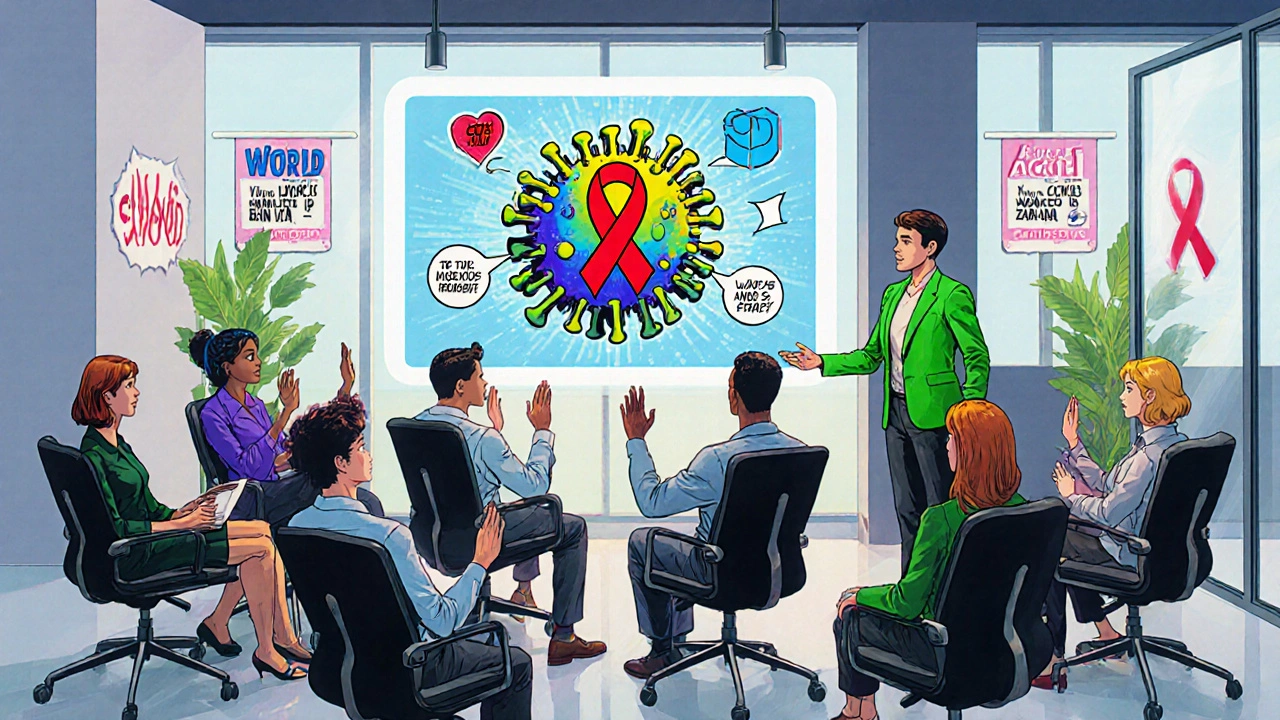Key Takeaways
- Understand the difference between HIV and AIDS and why accurate knowledge matters at work.
- Know your legal duties under New Zealand's Health and Safety Act and Human Rights Act.
- Implement clear confidentiality policies to protect employee privacy.
- Provide reasonable accommodations and mental‑health resources.
- Train managers and staff to challenge stigma and foster an inclusive culture.
Understanding AIDS and HIV at Work
When most people hear AIDS is the advanced stage of infection caused by the Human Immunodeficiency Virus (HIV), characterized by a severely weakened immune system. It’s crucial to remember that not everyone living with HIV has AIDS, and effective treatment can keep the virus suppressed for decades. In a workplace context, the key point is that an employee with HIV can perform most duties without restriction, especially when on antiretroviral therapy. By separating fact from fear, employers lay the groundwork for policies that protect health without compromising productivity.
Legal Framework Protecting Employees
New Zealand law offers strong safeguards. The Human Rights Act 1993 prohibits discrimination based on disability, which includes HIV/AIDS, and the Health and Safety at Work Act 2015 requires employers to manage health risks fairly. This means you must not fire, demote, or isolate an employee because of their status, and you must provide reasonable accommodations. Breaching these duties can result in legal claims, fines, and damage to reputation.
Debunking Myths and Reducing Stigma
Stigma stems from outdated myths: that HIV spreads through casual contact, that it’s a moral failing, or that people with AIDS are unable to work. A quick survey by the Ministry of Health in 2023 showed that 38% of New Zealanders still believed casual transmission was possible. By addressing these misconceptions through education, you dismantle the fear that fuels exclusion.
Crafting a Supportive Workplace Policy
A solid policy starts with clear language. It should state that HIV/AIDS is a protected characteristic, outline confidentiality rules, detail the process for requesting accommodations, and describe how to handle health‑related absences. Regularly review the document with legal counsel to stay compliant.

Ensuring Confidentiality and Privacy
Privacy is non‑negotiable. The Privacy Act 2020 requires that personal health information be stored securely and shared only with explicit consent. Designate a single HR point‑person to handle disclosures, keep records in locked digital folders, and avoid discussing an employee’s status in public areas. Breaches erode trust and can trigger legal action.
Reasonable Accommodations and Health Benefits
Accommodations might include flexible scheduling for medical appointments, modified duties during treatment side‑effects, or providing a quiet space for fatigue management. Offer comprehensive health insurance that covers antiretroviral medication and mental‑health counselling. When you invest in these supports, you not only comply with the law but also boost morale and retention.
Training and Ongoing Education
Education shouldn't be a one‑off event. Conduct interactive workshops that cover:
- The science of HIV transmission and treatment effectiveness.
- Legal rights and employer responsibilities.
- How to have respectful conversations if an employee discloses their status.
- Strategies to counteract stigma in everyday interactions.
Use real‑world case studies, such as the 2022 turnaround at a Wellington tech firm that reduced sick‑leave by 15% after implementing inclusive policies.
Managing Health Emergencies and Workplace Safety
While the risk of HIV transmission in the workplace is virtually nil, you should still have clear protocols for any incidents involving blood exposure. Provide training on universal precautions, make post‑exposure prophylaxis kits readily available, and ensure any exposed worker receives prompt medical assessment. This demonstrates care without singling out HIV status.

Quick Checklist for Employers
- Review and update your anti‑discrimination policy to explicitly include HIV/AIDS.
- Appoint a confidential point‑person for health disclosures.
- Secure health records in compliance with the Privacy Act.
- Offer flexible work arrangements for medical appointments.
- Provide comprehensive health coverage that includes antiretroviral therapy.
- Schedule mandatory training on HIV facts and stigma reduction.
- Establish clear post‑exposure response procedures.
- Conduct an annual audit of practices and employee feedback.
Legal Obligations vs. Best‑Practice Recommendations
| Area | Legal Minimum | Best Practice |
|---|---|---|
| Policy Language | Generic non‑discrimination clause | Specific HIV/AIDS protection language with clear procedures |
| Confidentiality | Store records securely | Limit access to a single HR liaison; use encrypted digital storage |
| Accommodations | Provide "reasonable" adjustments when requested | Proactively offer flexible hours and remote work options |
| Training | None mandated | Annual mandatory workshops with interactive modules |
| Health Benefits | Provide standard insurance | Include full antiretroviral coverage and mental‑health support |
| Post‑Exposure Protocol | Follow general health‑and‑safety rules | Maintain readily accessible prophylaxis kits and rapid response plan |
Creating an Inclusive Culture
Culture is built day‑by‑day. Celebrate diversity through employee resource groups, recognize World AIDS Day with informational campaigns, and encourage leaders to share supportive messages. When employees see that their workplace treats HIV/AIDS like any other health condition, anxiety fades and productivity rises. Remember, the goal isn’t just compliance-it’s a thriving, compassionate environment.
Frequently Asked Questions
Can an employee with HIV be forced to undergo medical testing?
No. Under New Zealand law, compulsory medical testing is prohibited unless there is a genuine safety risk unrelated to HIV. Employers must rely on voluntary disclosure and reasonable accommodations.
What should I do if a coworker is exposed to blood?
Follow your organisation’s post‑exposure protocol: clean the wound, report the incident immediately, provide access to post‑exposure prophylaxis, and arrange a medical evaluation. The response is the same regardless of the source’s HIV status.
How can I protect an employee’s privacy when they disclose HIV status?
Limit the information to the HR contact handling the case, store records in encrypted files, and share details only with managers who need them to arrange accommodations. Do not discuss the disclosure with other staff.
Are there financial incentives for offering HIV‑friendly benefits?
While there’s no direct government rebate, companies with inclusive health plans often see lower turnover and reduced absenteeism, translating into cost savings. Some insurers also offer lower premiums for comprehensive coverage packages.
What training resources are available for New Zealand employers?
The Ministry of Health provides free online modules on HIV facts and workplace inclusion. Organizations like the AIDS Foundation of New Zealand also offer customizable workshops and printable guides.

Honestly, the whole “mandatory training” thing feels like corporate overreach. Most workplaces already have non‑discrimination policies, and adding a separate HIV/AIDS module just creates extra paperwork. If you’ve got a solid HR handbook, employees will know the basics without a ten‑hour lecture. Plus, focusing too much on HIV can unintentionally single out the very people you’re trying to protect. A streamlined approach that treats HIV like any other chronic condition does the job without the buzz‑kill.